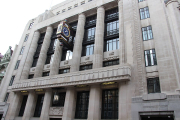
For six days, umbrellas, yellow ribbons, cartoon takedowns of politicians and song lyrics have been festooned across a city whose streets have been cleared of traffic to make way for a new wave of political protest.
Flyovers are plastered with hundreds of multicoloured notes voicing encouragement; posters of the city's leader characterised as a zombie or vampire hang from bridges; lampposts, footbridges and signs are tied with yellow ribbon -- one of the most widespread symbols of the protest movement.
Sympathisers at home and abroad have changed their social media profile pictures to an image of the ribbon, also used by other movements as a sign representing solidarity and freedom.
In a city that veers between scorching sunshine and torrential rain in summer and early autumn, umbrellas are a Hong Kong essential, which have now transcended the mundane -- after protesters used them to protect themselves from pepper spray, the movement earned a new name: The Umbrella Revolution.
Rows of umbrellas line the roads, pinned with ribbons while some have been turned into sculptures -- a tree of umbrellas was defiantly erected just outside the central government offices.
Surfaces in the city have been transformed into an opportunity for self-expression with many of the protest sites turning themselves into spontaneous open-air art galleries.
Roads have become a canvas for chalk drawings and slogans, tram stops that line the shopping and business districts hung with sketches and paintings, covering the promotional billboards.
Cartoons of Hong Kong's vilified leader CY Leung as a devil and a vampire -- and one of the leader with a baby's dummy and the slogan "Good baby", a reference to Leung being what many consider Beijing's stooge -- have also appeared.
The "umbrella revolution" in Hong Kong has also inspired an outburst of creativity by like-minded artists around the world with a number of artistic renditions of the protests trending on social media sites.
Music has also played a major part in uniting protesters, with a soundtrack of two or three key protest songs resonating among the crowds.
Hanging from one central footbridge is a yellow banner with words from John Lennon's "Imagine", reading "Some may say I'm a dreamer, but I'm not the only one".
But it is '80s ballad "Hoi Fut Tin Hung" (Under a Vast Sky) by Hong Kong band Beyond that has become the most popular rallying anthem of the protesters -- and the grave of its singer, Wong Ka Kui, a pilgrimage site.
Michael Wong, 16, visited the grave with two friends he is in a band with. The trio gathered around the grave, bowing their heads in respect, before lighting three cigarettes and placing them in an incense holder.
"It's not really a song about the government, it's about freedom, dreams and hope," said Wong. "Everyone in China who plays guitar knows this song." afp, photo by cdn4.dogomedia.com









































